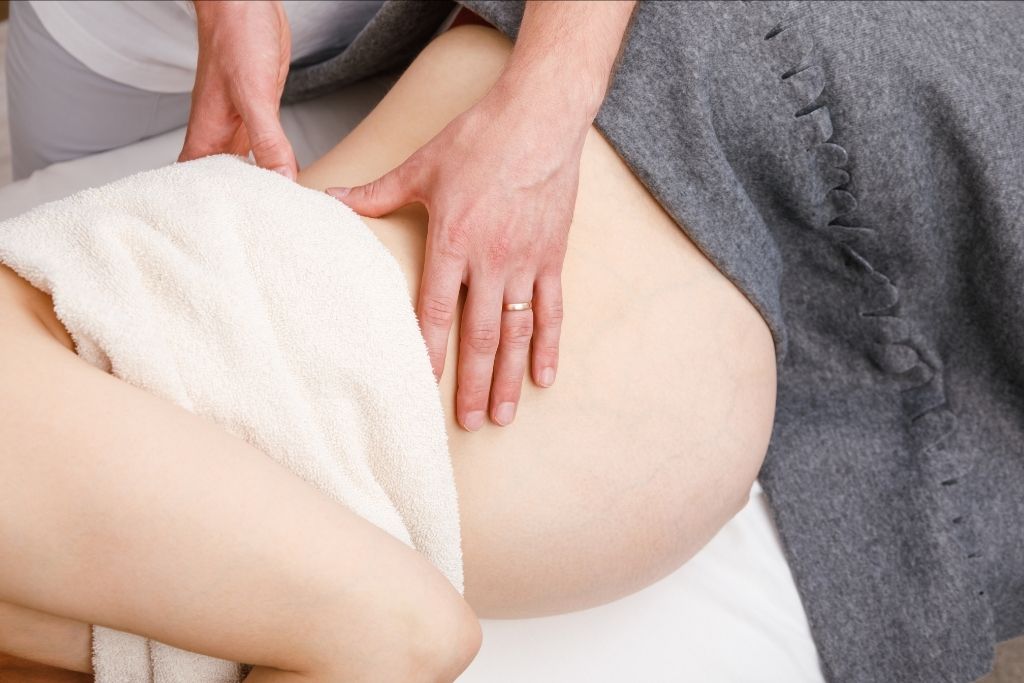Pregnancy brings all kinds of changes.
Your body feels like it’s working overtime, and honestly, it is. Your back starts to ache from the extra weight. Your feet swell by midday. Muscles you never noticed before suddenly tighten. Sleeping gets harder, and stress? Yeah, that climbs too.
So it’s no surprise that many moms-to-be start wondering… “Can I get a massage while pregnant?”
It sounds like the perfect solution: relaxation, relief, maybe even a little pampering. But is it safe? Is there a right time to start? Are all massages okay during pregnancy?
The short answer? Yes, you absolutely can.
But first, some important notes, particularly about timing, not getting hurt, and the need to find a certain type of therapist.
This post will go over everything that you want to know before booking that massage. You can expect everything from benefits to precautions to real-world tips so you can see the whole picture of how massage fits into a healthy pregnancy lifestyle.
Let’s dive in.
What Is Prenatal Massage?
Prenatal massage is not the same as a regular massage with a new name: it is a type of bodywork that has been adapted for pregnancy.
A lot happens with your body in those nine months. Hormones shift, your posture changes, muscles are elongated, and joints take on a heavier load than ever; all of that is taken into account with a prenatal massage. It is designed to help your body feel supported at every stage of pregnancy.
Prenatal massage, however, steers clear of specific pressure points (particularly those in the wrists, ankles, and lower back) that, if not dealt with properly, might initiate contractions (via Previous). Which is why training and technique are so important.
And don’t get in a tizzy; this is no superficial gliding. Done by a qualified prenatal therapist, it can provide effective, profound relief. The intention is to alleviate tension, soothe discomfort, enhance blood flow, and bring you greater steadiness and evenness.
The best part? You need to give respite not only to your body. Prenatal massage is a great way to soothe the nervous system, decrease anxiety, and reconnect, more gently, with a body that is doing very big, beautiful, and different things.
Which is why, no, you aren’t being “extra” (that awful word) for wanting a massage while pregnant. It does sound smart, and the one person your newborn really needs to look after is YOU.
Benefits of Massage During Pregnancy
But pregnancy is beautiful, and it totally destroys your body. A solid rub can provide genuine relief, physically and mentally. This is what it can do for you:
Eases Back Pain
As your belly gets bigger, it changes your posture and puts more strain on your lower back. Relaxing tight muscles and relieving the pressure on your spine is what a massage accomplishes.
Reduces Swelling
It is therefore not unusual for the hands, feet, and ankles to swell. It moves excess fluid around your system faster, as well as improves circulation.
Improves Sleep
When your muscles tense, it can be hard to get a good night’s sleep. Massage brings tranquility to your body and mind, allowing you to fall into slumber sans delay and stay asleep much more soundly.
Lowers Stress and Anxiety
It triggers the release of good hormones (serotonin and dopamine) that make one feel better. That’s far less anxiety, improved peace of mind, and morale.
Relieves Sciatic Nerve Pain
Your growing uterus presses on the sciatic nerve. It relieves sharp, shooting pain and massages surrounding muscles.

Types of Massages Safe During Pregnancy
During pregnancy, it’s important to choose massage techniques that are gentle and safe for both you and your baby. Prenatal massages focus on relieving discomfort without straining your body.
Safe massage types include:
- Swedish Massage: Gentle strokes to relax muscles and improve circulation.
- Lymphatic Drainage Massage: Light movements that reduce swelling by moving excess fluid.
- Gentle Stretching & Myofascial Release: Soft techniques to ease tight muscles and increase flexibility.
With the right massage style and therapist, you can enjoy relaxation and relief while supporting a healthy pregnancy.
When Is It Safe to Get a Prenatal Massage?
Most professionals agree it’s safe to get massages after the first trimester. Why? The first 12 weeks are delicate. Many therapists won’t work on pregnant clients before week 13 just to be cautious.
Always check with your doctor before booking a session.
Every pregnancy is different. If you have complications, like high blood pressure, preeclampsia, or a high-risk pregnancy, your doctor might have different advice.
What to Expect During a Prenatal Massage
Think of it as a regular massage, but with extra care. Here’s what’s different:
Positioning
You won’t lie on your belly. Instead, you’ll usually be on your side, with pillows for support. Some spas offer special tables with belly cutouts, but side-lying is often more comfortable and safer.
Pressure
Deep tissue? Not usually. Therapists use lighter pressure, especially around your legs. They’ll avoid deep work on certain pressure points that could cause contractions.
Communication
Good therapists check in often. If something feels off, speak up. Massage should never hurt, especially during pregnancy.
Who Should Perform the Massage?
Not every massage therapist is trained in prenatal massage. Look for someone certified in prenatal or pregnancy massage. Ask upfront:
- Are you trained in prenatal massage?
- What’s your experience with pregnant clients?
- Do you know which areas to avoid?
Don’t settle. Your body’s going through enough; only trust licensed professionals.
When You Shouldn’t Get a Massage While Pregnant
There are a few times when massage is not recommended:
- High-risk pregnancies
- History of miscarriage
- Blood clots or deep vein thrombosis
- Preeclampsia
- Placenta previa or placental abruption
In these cases, massage could do more harm than good. Again, your doctor’s guidance comes first.
How Often Can You Get One?
There’s no hard rule, but here’s a helpful guideline:
| Trimester | Suggested Frequency |
| 2nd Trimester | Every 3–4 weeks |
| 3rd Trimester | Every 2–3 weeks |
| Last Month | Weekly, if it feels good |
Listen to your body. If you feel better after a massage, go for it regularly. If not, ease off. It’s not about a rigid schedule; it’s about what helps you.
Other Pregnancy-Safe Alternatives
If massage isn’t an option, there are other ways to relax those sore muscles:
- Warm (not hot) baths
- Foam rolling (with caution)
- Gentle prenatal yoga
- Heating pads on low
- Maternity support belts
All of these offer relief in a safe way.
Frequently Asked Questions
1. Can I get a massage while pregnant in the first trimester?
Most professionals advise waiting until after the first trimester for massages due to the delicate nature of early pregnancy. Always check with your doctor first.
2. Is it safe to get a back massage during early pregnancy?
Gentle back massages can help ease tension, but in early pregnancy, it’s best to be cautious and consult your healthcare provider to avoid any risks.
3. Can I lay on my stomach for a massage while pregnant?
No, lying on your stomach during a massage is not safe while pregnant. Therapists usually position clients on their side with pillows for support.
4. When is the best time during pregnancy to get a massage?
Most professionals recommend waiting until after the first trimester (after 12 weeks) to begin prenatal massage sessions.
Final Thoughts: Can You Get a Massage While Pregnant?
Yes, you can, and, for many women, you should. It can ease physical strain, improve mood, and help you feel like you again. Just make sure to:
- Wait until after the first trimester.
- Choose a certified prenatal therapist.
- Get approval from your doctor.
- Speak up if anything feels wrong.
Pregnancy is tough. Massage can be a soothing, healing part of the journey if done safely and mindfully.

